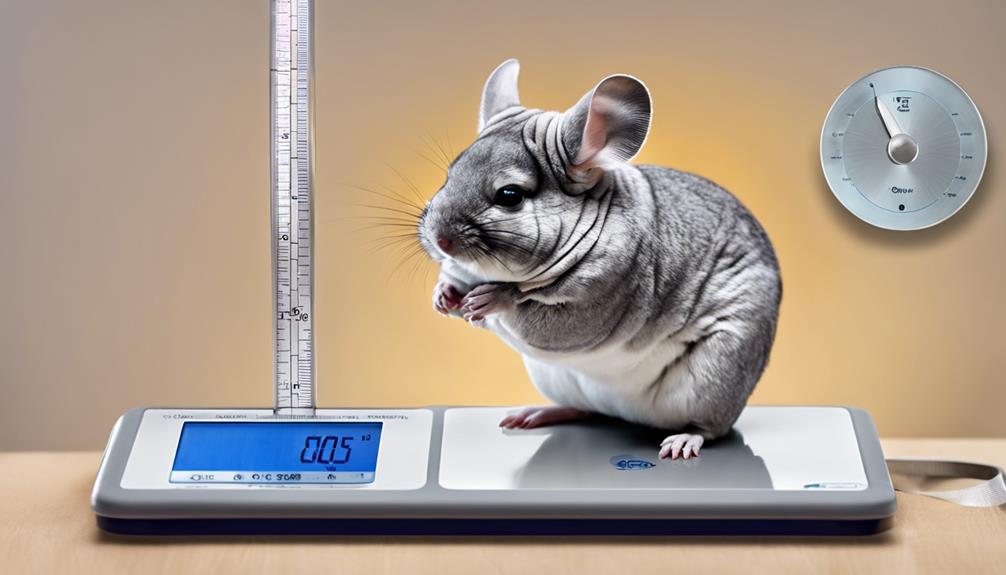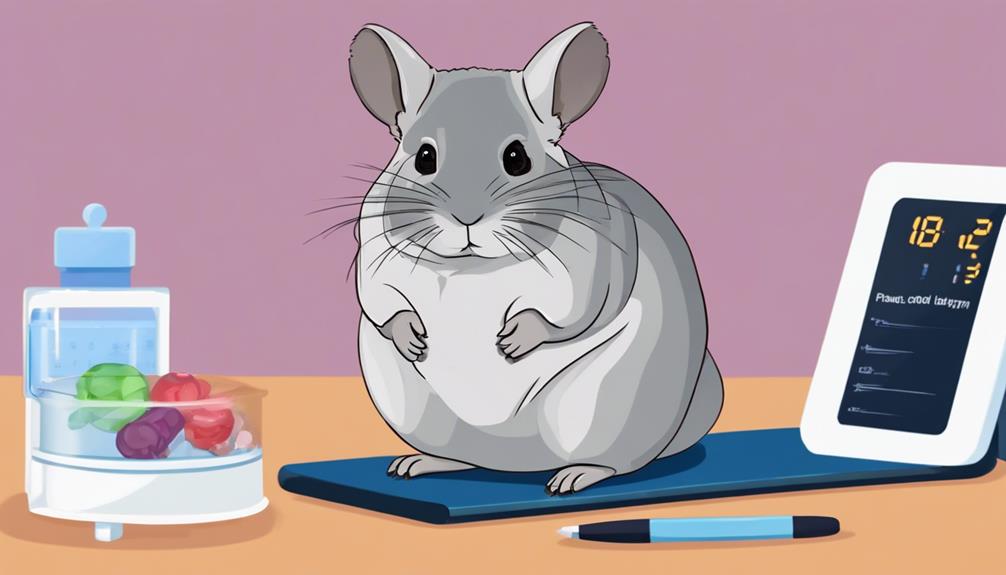Why Monitoring Your Chinchilla's Weight Is Important for Dietary Adjustments

Regular weighing can help you track your chinchilla's weight fluctuations and identify any potential issues that may arise. It is recommended to weigh your chinchilla at least once a month using a digital scale specifically designed for small animals. This practice allows you to make timely adjustments to their diet and detect any health problems early on. Additionally, keeping a record of your chinchilla's weight over time can provide valuable information for your veterinarian during routine check-ups or in case of emergencies.
Health Benefits of Weight Monitoring
Monitoring your chinchilla's weight not only helps you track their health but also allows for timely dietary adjustments to maintain their well-being. Weight management plays an important role in ensuring your furry friend is healthy and happy. By tracking their weight regularly, you can detect any fluctuations early on, indicating potential health issues. This proactive approach enables you to address concerns promptly, preventing more serious complications down the road.
Nutrition tracking is intertwined with weight management when it comes to your chinchilla's well-being. Monitoring their weight provides valuable insights into whether their current diet is meeting their nutritional needs adequately. If you notice sudden weight changes, it may indicate a need to adjust their food intake or switch to a more suitable diet plan. Keeping a close eye on their weight allows you to make informed decisions about their nutrition, ultimately promoting a balanced and healthy lifestyle for your beloved chinchilla.
Understanding Chinchilla Dietary Needs
Once upon a time, your chinchilla's dietary needs were a mystery to you. However, as you journey through the world of chinchilla care, you begin to unravel the secrets of their key dietary requirements and the importance of nutritional balance.
Key Dietary Requirements
Understanding the dietary needs of your chinchilla is essential for ensuring their overall health and well-being. Just like you benefit from a balanced diet and regular exercise, your chinchilla also requires specific care.
Along with their main diet of hay, pellets, and fresh water, consider incorporating dietary supplements like vitamin C to boost their immune system. Chinchillas are active creatures, so providing them with an exercise regimen through playtime and ample space to move around is important for their physical and mental health.
Nutritional Balance Importance
As your chinchilla thrives on a diet of hay, pellets, and fresh water, grasping the significance of nutritional balance is key to meeting their dietary needs effectively. Ensuring that your furry friend receives the right balance of nutrients is essential for their overall health and well-being.
To achieve this balance, consider the following:
- Variety is Essential: Offer a diverse range of hay and pellets to provide essential nutrients.
- Portion Control: Monitor the amount of food given to prevent overeating and obesity.
- Nutritional Supplements: Consult with a veterinarian to determine if supplements are necessary for your chinchilla's diet.
- Exercise Regimen: Encourage physical activity through playtime and exercise to keep your chinchilla healthy and active.
Health Implications of Diet
To maintain your chinchilla's well-being and vitality, it is important to understand the dietary needs that impact their health. Chinchillas have specific dietary restrictions that must be followed to vital they stay healthy and happy. Weight management is vital for their overall well-being, as obesity can lead to various health issues. Here is a simple guide to help you understand the health implications of your chinchilla's diet:
| Dietary Restrictions | Health Implications | Weight Management |
|---|---|---|
| High-Fat Treats | Digestive Problems | Monitor Food Intake |
| Sugary Foods | Dental Issues | Provide Regular Exercise |
| Too Many Pellets | Obesity | Offer Fresh Hay Daily |
| Lack of Hay | Nutrient Deficiencies | Regular Weigh-Ins |
Identifying Weight Fluctuations Early
Keep a vigilant eye on your chinchilla's weight by regularly evaluating any subtle changes that may indicate early weight fluctuations. Chinchillas, like any other pet, can sometimes experience weight fluctuations that may signal underlying health issues. By identifying these changes early on, you can take proactive steps to guarantee your chinchilla's health and well-being.
Here are some key ways to help you recognize weight shifts in your furry friend:
- Regular Weigh-ins: Weigh your chinchilla regularly using a reliable scale to track any changes over time.
- Physical Observations: Pay attention to your chinchilla's body shape and size, looking for any noticeable differences.
- Behavioral Cues: Changes in eating habits, activity levels, or grooming behaviors can also indicate weight fluctuations.
- Consulting a Vet: If you notice any concerning changes, seek advice from a veterinarian experienced in chinchilla care for early intervention and weight management strategies.
Adjusting Diet for Optimal Health

Begin on a journey to enhance your chinchilla's health by making thoughtful adjustments to its diet for peak well-being. Just like a gardener tends to their plants with care, nurturing them to grow strong and vibrant, so too can you nurture your furry friend.
Consider incorporating an exercise regimen into your chinchilla's routine. Encouraging movement and play not only keeps them physically active but also stimulates their mind, promoting overall well-being.
Furthermore, portion control plays a crucial role in maintaining your chinchilla's health. Just as a chef carefully measures ingredients to create a balanced dish, you too can make sure that your chinchilla receives the right amount of food. Overfeeding can lead to various health issues, while underfeeding can result in deficiencies.
Preventing Obesity in Chinchillas
Once upon a time, in the world of chinchillas, keeping your furry friend at a healthy weight is important for their well-being.
By understanding the risk factors for obesity, balancing their diet, and regularly monitoring their weight, you can help prevent your chinchilla from facing health issues.
Obesity Risk Factors
To maintain your chinchilla's peak health and prevent obesity, understanding the risk factors is essential. Imagine setting out on a journey to safeguard your furry companion from the perils of excess weight. Along this expedition, be mindful of the following:
- Overfeeding: Resist the urge to overindulge your chinchilla with treats.
- Lack of Exercise: Encourage physical activity to keep your pet agile and healthy.
- Poor Diet Choices: Opt for high-quality chinchilla pellets and hay over sugary snacks.
- Genetic Predisposition: Some chinchillas may be more prone to obesity, requiring extra vigilance.
Dietary Balance Importance
In the quest to prevent obesity in your chinchilla, achieving a balanced diet holds the key to their well-being and energy. By carefully balancing their food intake, you can help your chinchilla maintain a healthy weight and prevent the risks associated with obesity. A well-rounded diet guarantees they receive all the necessary nutrients while keeping a check on excessive calorie consumption. Here is a simple guide to help you maintain the dietary balance your chinchilla needs:
| Food Group | Importance | Suggested Frequency |
|---|---|---|
| Hay | Essential for digestion | Unlimited |
| Pellets | Balanced nutrients | 1-2 tablespoons daily |
| Fresh Vegetables | Added nutrients | 1 tablespoon daily |
| Fresh Water | Hydration | Always available |
| Treats | Occasional rewards | 1-2 times a week |
Weight Monitoring Strategies
As you journey towards maintaining your chinchilla's peak health, vigilantly monitoring their weight serves as an important tool in safeguarding them against obesity. Keeping a watchful eye on your chinchilla's weight will help you make informed decisions regarding their diet and overall well-being.
Here are some weight management strategies for your furry friend:
- Regular Weigh-ins: Weigh your chinchilla frequently to track any fluctuations.
- Balanced Diet: Make sure your chinchilla is receiving the appropriate nutrients for their health.
- Exercise Encouragement: Promote physical activity to keep your chinchilla active and healthy.
- Consultation with a Vet: Seek professional advice when considering dietary adjustments or weight management strategies.
Monitoring Weight for Senior Chinchillas
With senior chinchillas, keeping a watchful eye on their weight can provide valuable insights into their health and well-being. Senior chinchilla care requires extra attention to detail, especially when it comes to weight management strategies. As chinchillas age, their dietary needs may change, impacting their weight and overall health. By monitoring their weight regularly, you can detect any fluctuations early on and make necessary adjustments to their diet.
Senior chinchillas may experience weight loss due to various factors such as dental issues, decreased appetite, or underlying health conditions. On the other hand, weight gain can also be a concern, leading to potential health risks. By observing changes in your senior chinchilla's weight, you can work towards maintaining their ideal weight for peak health and well-being.
Consultation With a Vet for Guidance

Consider reaching out to a veterinarian for invaluable guidance on monitoring and managing your senior chinchilla's weight effectively. Your veterinarian can provide personalized recommendations and expertise tailored to your chinchilla's specific needs, guaranteeing ideal weight management and overall chinchilla health. Here are some key points to keep in mind during your consultation:
- Vet Recommendations: Your vet can offer tailored advice on dietary adjustments and feeding schedules to help your chinchilla maintain a healthy weight.
- Dietary Adjustments: Through consultation with your vet, you can learn about the best foods and portion sizes for your senior chinchilla to support weight management.
- Weight Management: Your veterinarian can guide you on how to monitor your chinchilla's weight at home and when to seek further assistance.
- Chinchilla Health: Regular check-ups with your vet can make certain that any weight-related issues are promptly addressed, promoting your chinchilla's overall well-being.
Frequently Asked Questions
Can Chinchillas Gain Weight Due to Stress or Changes in Their Environment?
Yes, chinchillas can gain weight due to stress or changes in their environment. Stress-induced weight gain and environmental factors impacting weight are common in chinchillas. Monitoring these changes is crucial for their well-being.
How Often Should I Weigh My Chinchilla to Accurately Monitor Their Weight?
As you ponder how often to weigh your chinchilla, remember that weight fluctuations occur due to seasonal changes, diet modifications, and regular exercise. Balancing these factors will guide you in monitoring your chinchilla's well-being.
Are There Specific Signs or Symptoms I Should Look Out for That Indicate My Chinchilla Is Overweight?
To determine if your chinchilla is overweight, observe for reduced activity levels, difficulty moving, and visible rolls of fat. Adjust exercise routines and limit treats if needed. Remember, a healthy chinchilla is a happy chinchilla!
Are There Any Specific Dietary Supplements or Foods That Can Help With Weight Management in Chinchillas?
To manage your chinchilla's weight, consider dietary supplements cautiously. Validate they meet specific needs without overfeeding. Implement exercise routines gradually, fostering healthy habits. Monitor food intake to avoid restrictions, nurturing a balanced and active lifestyle for your furry friend.
Can Weight Fluctuations in Chinchillas Be Indicative of Underlying Health Issues Beyond Just Dietary Concerns?
Your chinchilla's weight fluctuations can tell tales beyond just diet worries. Health conditions and genetics play a role, alongside exercise levels. Watching those pounds isn't just about food—it's your furry friend's story.











